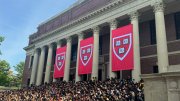In his Baccalaureate Address on May 27, President Alan M. Garber focused on the undergraduate experience, rather than events occurring outside the gates of Harvard Yard. He told the graduating seniors about his time as a College student and the importance of the lifelong friends he had made, as theirs would be to them, and shared how an academic mentor helped shape his career. His only reference to current events was, “Advocate for education.” That advice transcended Harvard (whose position at the pinnacle of biomedical research is under threat, as institutions in Europe and China woo some of the world’s preeminent researchers, see page 30). The Trump administration has pulled federal research funding from other universities across the country, and the U.S. Department of Education is ending funding for many K-12 educational programs.
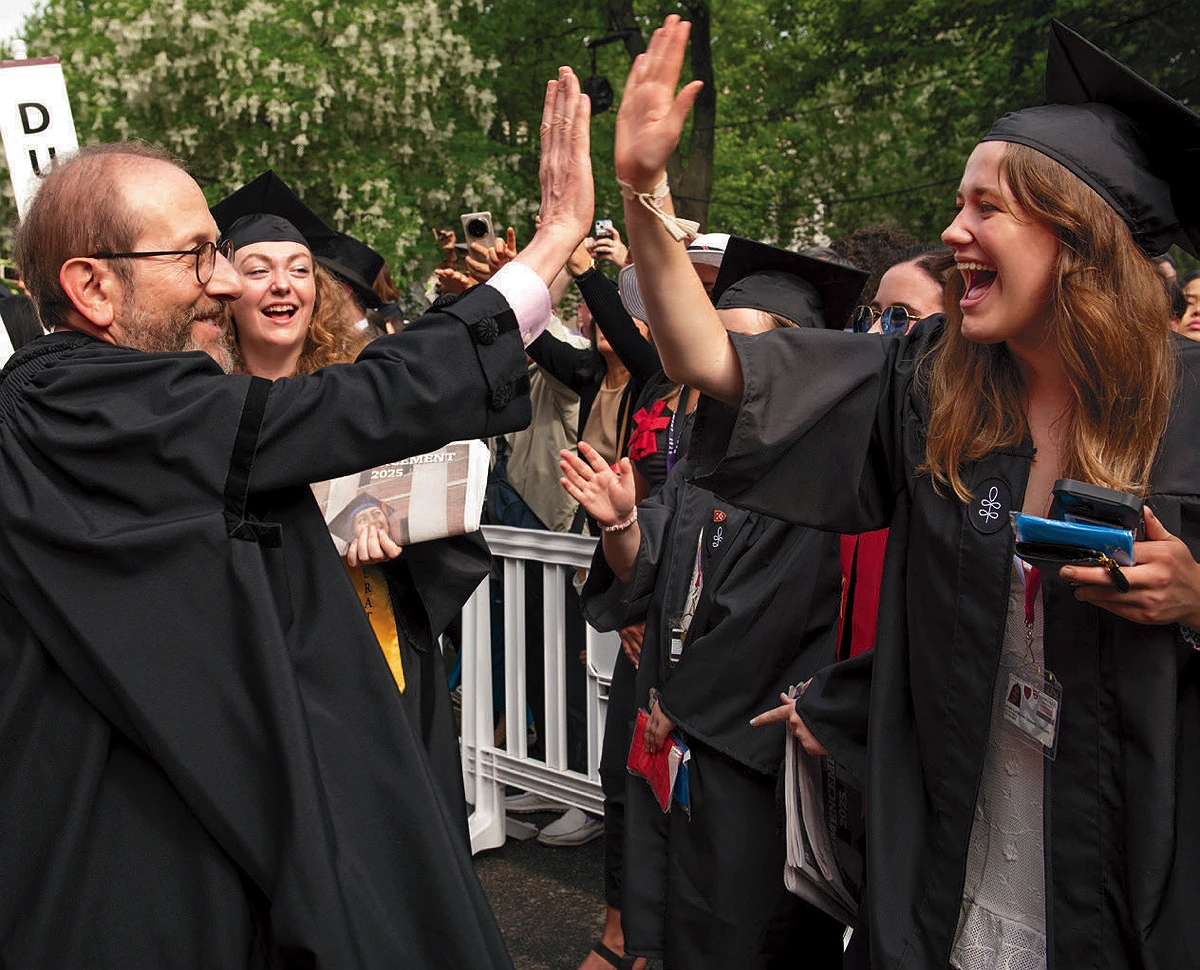
But Harvard has been unmistakably at the center of Trump’s assault, and that knowledge hung heavily over this year’s proceedings. Hardly a week had passed this spring without news of some further deprivation: first, the freezing of $2.2 billion in research funding; then legislation to tax investment gains in endowments of nonprofit institutions of higher education; then an order, within days of Commencement, to revoke Harvard’s ability to allow international students to study at the University and contribute to campus life.
There is nothing like an outside attack to unite a fractured campus. A year after the turmoil surrounding the Israel-Palestine conflict made the 2024 Commencement exercises a fraught and sometimes-divided affair, large groups of alumni rallied to Harvard’s defense. Letters poured in to Massachusetts Hall and to this magazine praising Harvard and its president for refusing to accede to the government’s demands. The modest and unassuming Garber, who has never sought the limelight, became a hero.
And in speeches across campus from Cambridge to Boston, in class days and convocations, and in the unauthorized celebrations of affinity groups (for black, Latinx, Asian and Asian American, and LBGTQ+ students, as well as veterans, first-generation and low-income students, and students with disabilities), the story was about resistance.
“The legitimacy of our institutions depends not just on what we know, but how we act and commit to veritas.”
At the Phi Beta Kappa literary exercises, Danoff Dean of Harvard College Rakesh Khurana, who steps down June 30, drew a standing ovation when he praised Garber for modeling “what it means to stand for principle over expedience in the face of these threats. His steady leadership has reminded us that the legitimacy of our institutions depends not just on what we know, but how we act and commit to veritas.”
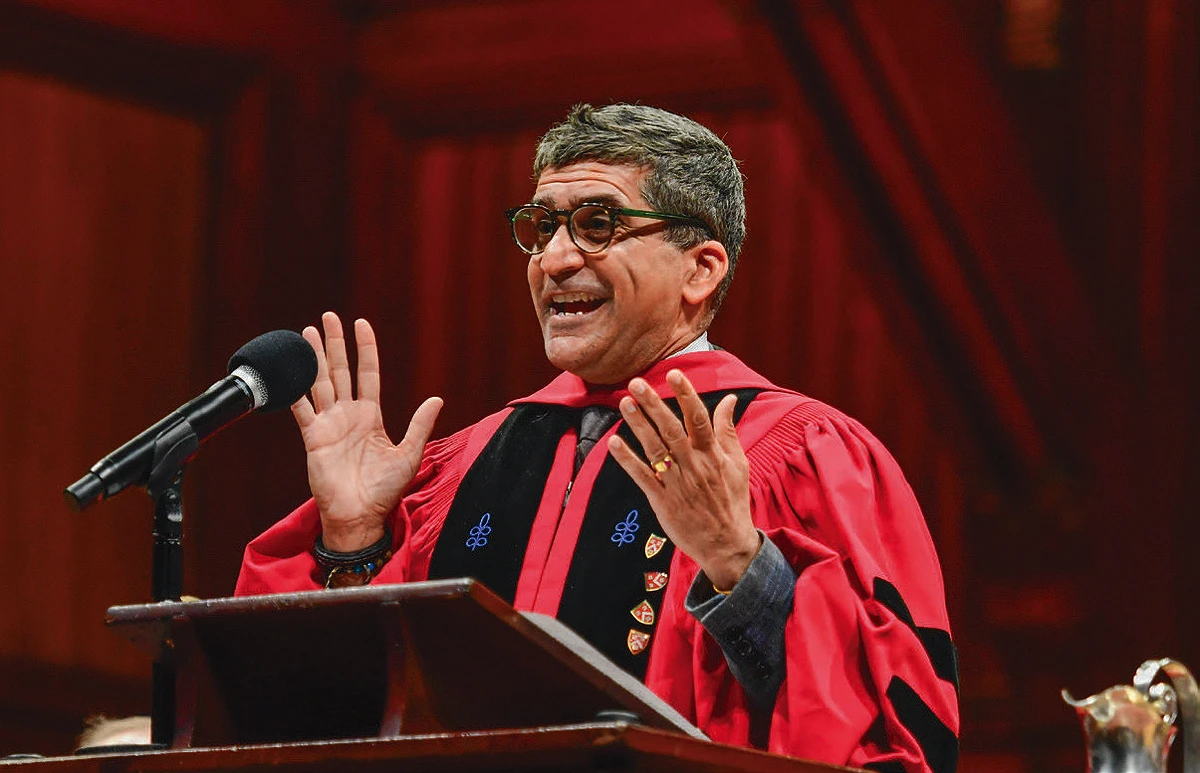
At Harvard College Class Day on Wednesday, Kareem Abdul-Jabbar, on whom an honorary doctor of laws was conferred the next day, recalled Dr. Martin Luther King Jr.’s response after the 1956 bombing of his home by segregationists: “Remember that if anything happens to me, there will be others to take my place.” In Harvard, Abdul-Jabbar said, he sees evidence that King’s confidence was justified: “After seeing so many cowering billionaires, media moguls, law firms, politicians, and other universities bend their knee to an administration that is systematically strip mining the U.S. Constitution,” he said, “it is inspiring to me to see Harvard University take a stand for freedom.”
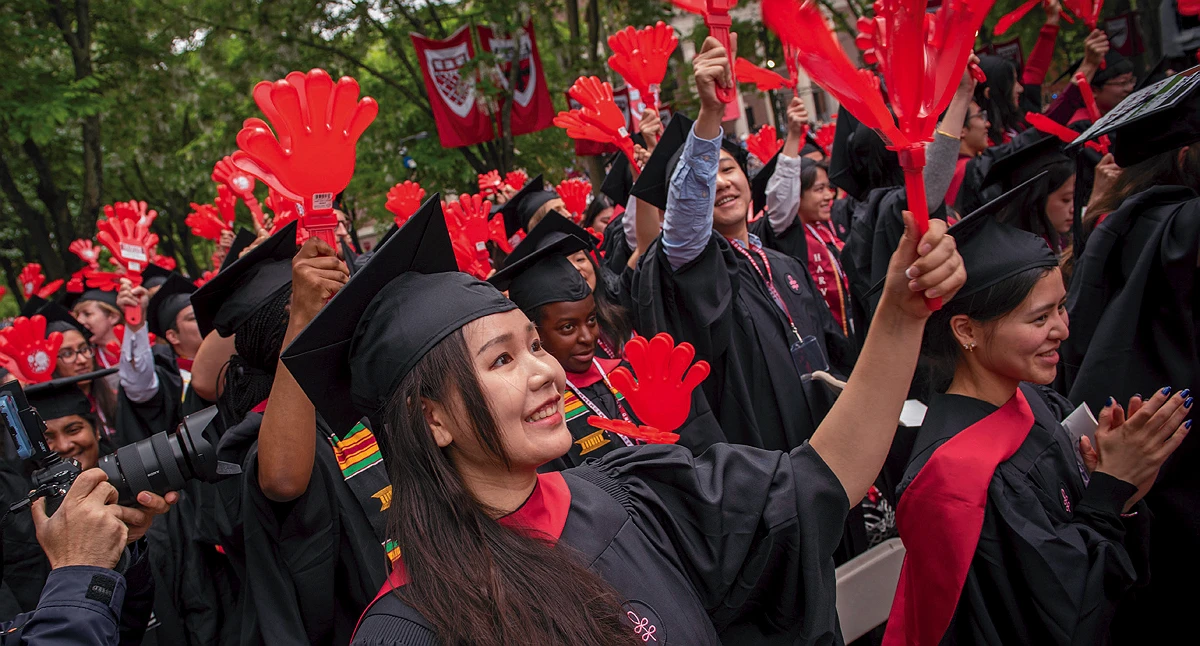
At the School of Public Health’s convocation, infectious diseases expert Céline R. Gounder, the keynote speaker, described a “war on science.” At the Harvard Medical School Master’s Convocation ceremony, Dean George Q. Daley described Harvard as “the most direct target of the current administration’s tectonic shift in priorities,” amidst “catastrophic funding cuts” in which “essential life-saving research is being canceled altogether.”
And at the Graduate School of Education, Hobbs professor of cognition and education Catherine Snow tried to make sense of “the challenges to education and the academy that are facing us,” but also implicated the University in the current political atmosphere:
I’ve come to realize now how naive we’ve been to assume that the values that Harvard stands for are widely shared, that producing life-enhancing and life-saving research was enough to justify our existence, that the undeniable benefits of constituting a student body that is heterogeneous—I think that’s a word we can still use—heterogeneous in national origins, in ethnicity, in language, in culture, and experience—that those benefits would be obvious to all. It seems, though, that we have failed somehow to communicate our strongest commitment and deepest values in ways that make sense to many of our fellow citizens, and that is our failure.
Perhaps our focus on performative actions, on pronouns and anti-racist workshops and diversity slogans, has masked the degree to which those performances represent, however inadequately, deep commitments to shared values; to an effort to create a world in which words like ‘marginalized’ and ‘minoritized’ are no longer necessary, and in which diversity is valued for its undeniable contributions to a group’s effective functioning and to individuals’ critical thinking.
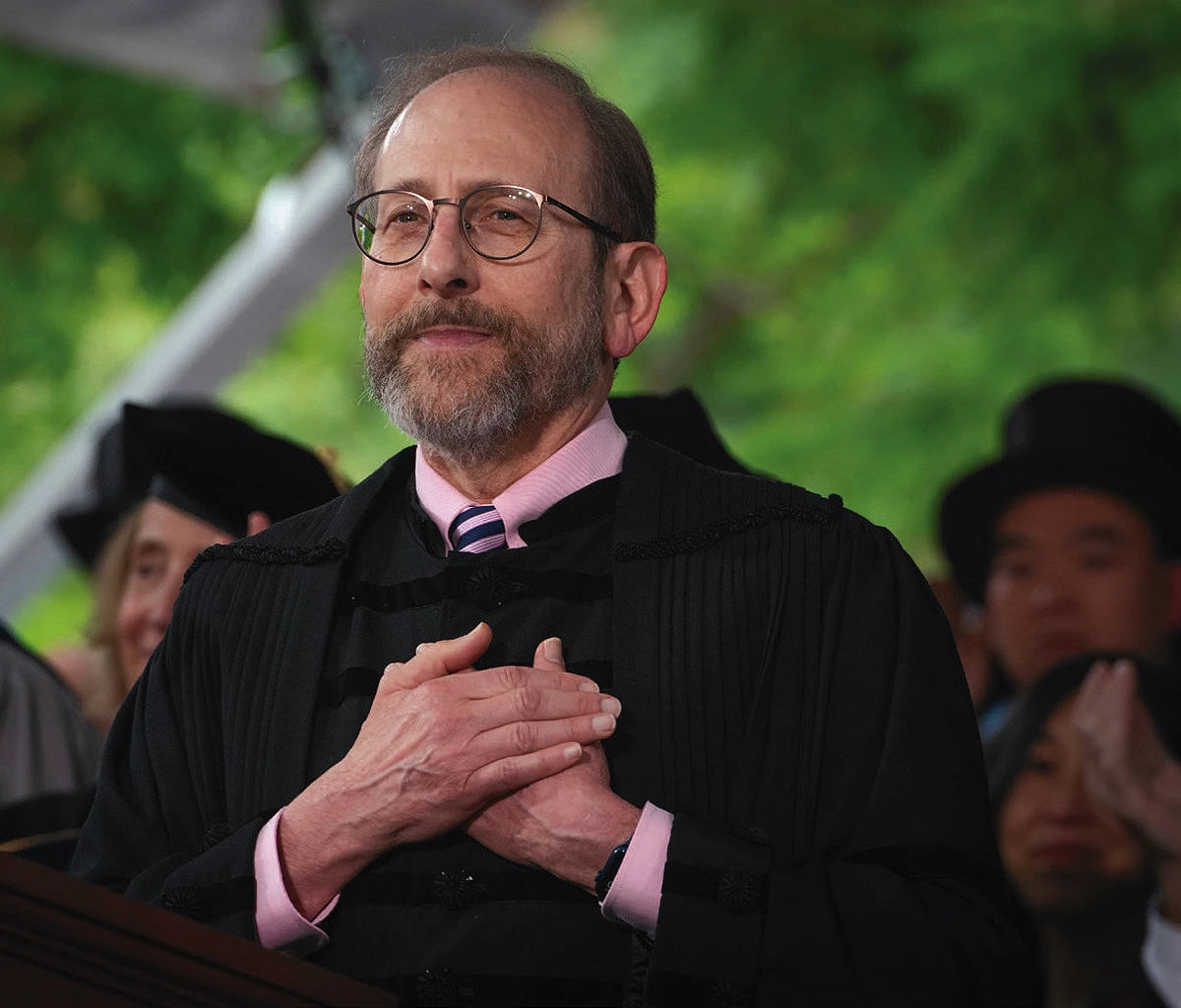
Commencement
Garber echoed those sentiments on Commencement Day. After emphasizing that he was welcoming graduates from “around the world, just as it should be,” he warned against complacency:
The world as it is tempts us with the lure of what one might generously call comfortable thinking, a habit of mind that readily convinces us of the merits of our own assumptions, the veracity of our own arguments, and the soundness of our own opinions, positions, and perspectives—so committed to our beliefs that we seek information that confirms them as we discredit evidence that refutes them.
“Absolute certainty and willful ignorance are two sides of the same coin....”
Though many would be loath to admit it, absolute certainty and willful ignorance are two sides of the same coin, a coin with no value but costs beyond measure. False conviction saps true potential. Focused on satisfying a deep desire to be right, we can willingly lose that which is so often gained from being wrong—humility, empathy, generosity, insight—squandering opportunities to expand our thinking and to change our minds in the process.
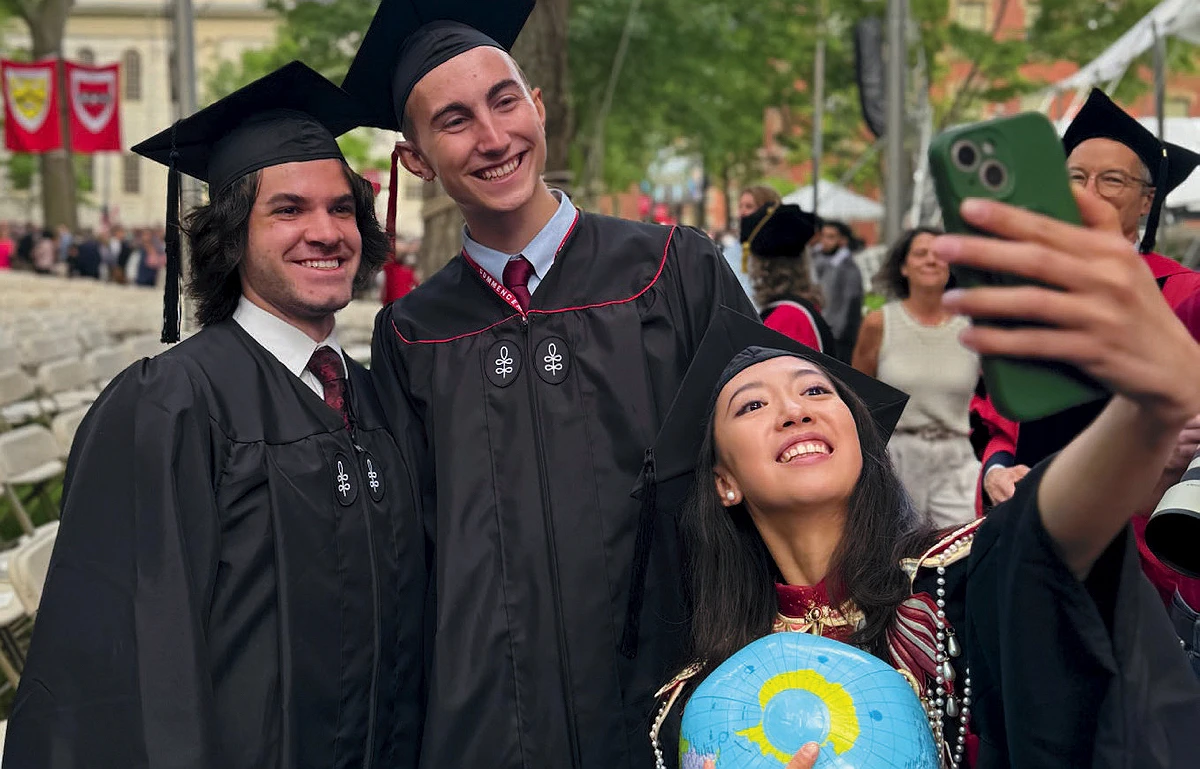
“Stay Soft in Hard Times”
The two undergraduate student speakers, Latin Salutatorian Aidan Robert Scully ’25 and Senior English Orator Thor Reimann ’25, both made references to the ability to converse across boundaries and engage with the unfamiliar and the unknown. Then, in a parable worthy of John Donne (“No Man is an Island”), Graduate Orator Yurong “Luanna” Jiang, M.P.A. ’25, described an experience during her internship last summer in Mongolia:
“I got a call from two classmates in Tanzania. They had a very urgent question: how to use their washing machine—because all the labels were in Chinese, and Google kept translating a big button as “Spinning Ghost Mode.”
There we were: an Indian and a Thai calling me, a Chinese in Mongolia, to decipher a washer in Tanzania. And we all study together here at Harvard.
That moment reminds me of something I used to believe when I was a kid: that the world was becoming a small village. I remember being told we would be the first generation to end hunger and poverty for humankind.
My program at Harvard is international development. It was built on this exact beautiful vision that humanity rises and falls as one. When I met my 77 classmates from 32 different countries, the countries I knew only as colorful shapes on a map turned into real people—with laughter, dreams, and the perseverance to survive the long winter in Cambridge—we danced through each other’s traditions and carried the weight of each other’s worlds. Global challenges suddenly felt personal….
If there’s a woman anywhere in the world who cannot afford a period pad, it makes me poorer. If a girl skips school out of fear of harassment, that threatens my dignity. If a little boy dies in a war that he didn’t start and never understood, part of me dies with him.
But today, that promise of a connected world is giving way to division, fear, and conflict. We’re starting to believe that people who think differently, vote differently, or pray differently—whether they’re across the ocean or sitting right next to us—are not just wrong. We mistakenly see them as evil.
But it doesn’t have to be this way. What I’ve gained most from Harvard isn’t just calculus or regression analysis. It’s to sit with discomfort. Listen deeply. And stay soft in hard times.
After Jiang’s speech, degrees were conferred on the graduates, and on the honorands. After the reading of honorary degree recipient Rita Moreno’s citation (“…she shows there’s a place for us, somewhere”), a soaring musical tribute followed: the song “Somewhere” from West Side Story (with music by Leonard Bernstein ’39, D.Mu.’67), performed by Carolyn Hao ’26 and Henry Wu ’25. Hao’s lovely, clear voice brought tears to the spry, 93-year-old honorand’s eyes, and she joined Hao in singing at the end.
Abraham Verghese, the author, physician, and principal speaker of the day, received his honorary degree last by tradition. Verghese praised Harvard for resisting the federal administration’s demands.
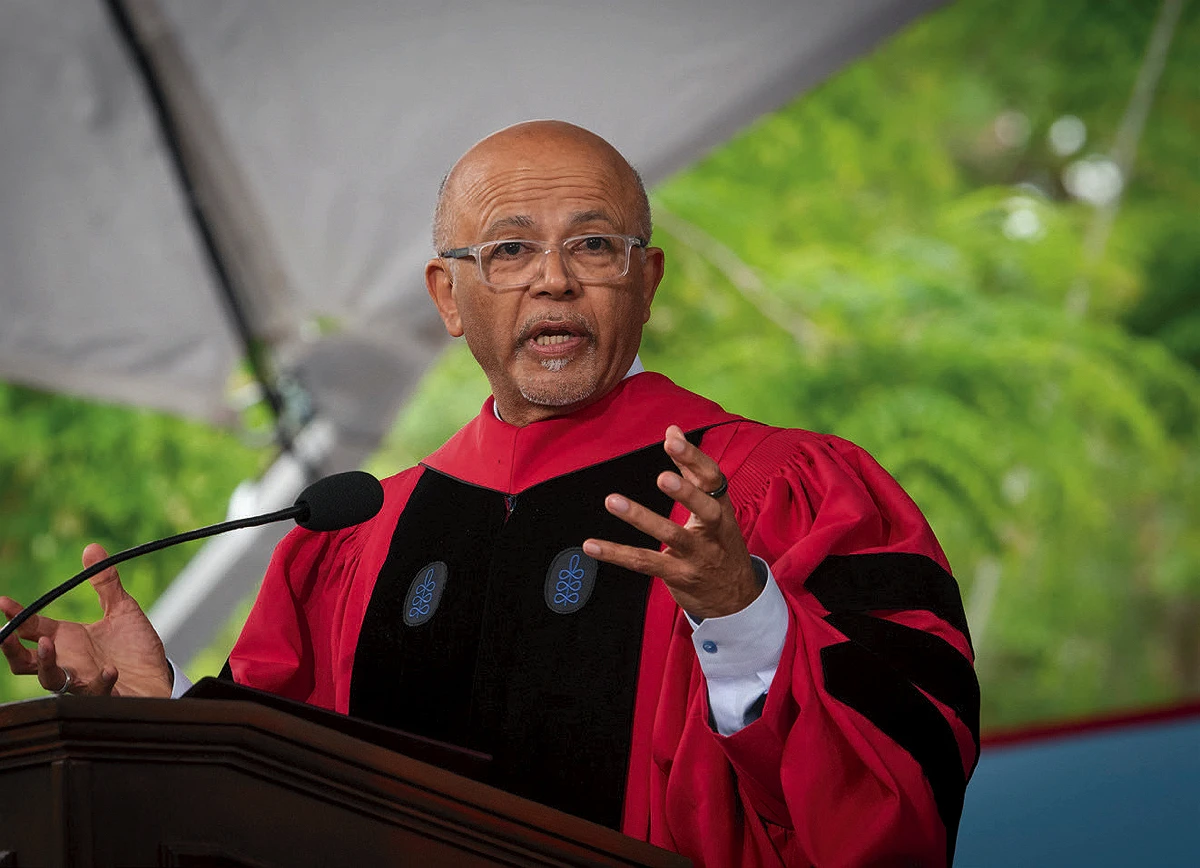
“More people than you realize,” he told the 2025 graduates, “are grateful to Harvard for the example it has set—by your willingness to look inward, to make painful and necessary changes but then ultimately, by your clarity in affirming and courageously defending the essential values of this University, and indeed of this nation.”
He reflected on his own experience as an immigrant to this country, and why this made his message particularly relevant now:
When legal immigrants and others who are lawfully in this country, including so many of your international students, worry about being wrongly detained and even deported, perhaps it’s fitting that you hear from an immigrant like me….
In these past few weeks, in the face of immense pressure, Harvard, under President Garber’s steady leadership, has been very visible for taking decisions worthy of your University’s heritage, decisions that reveal and will shape this University’s character.”
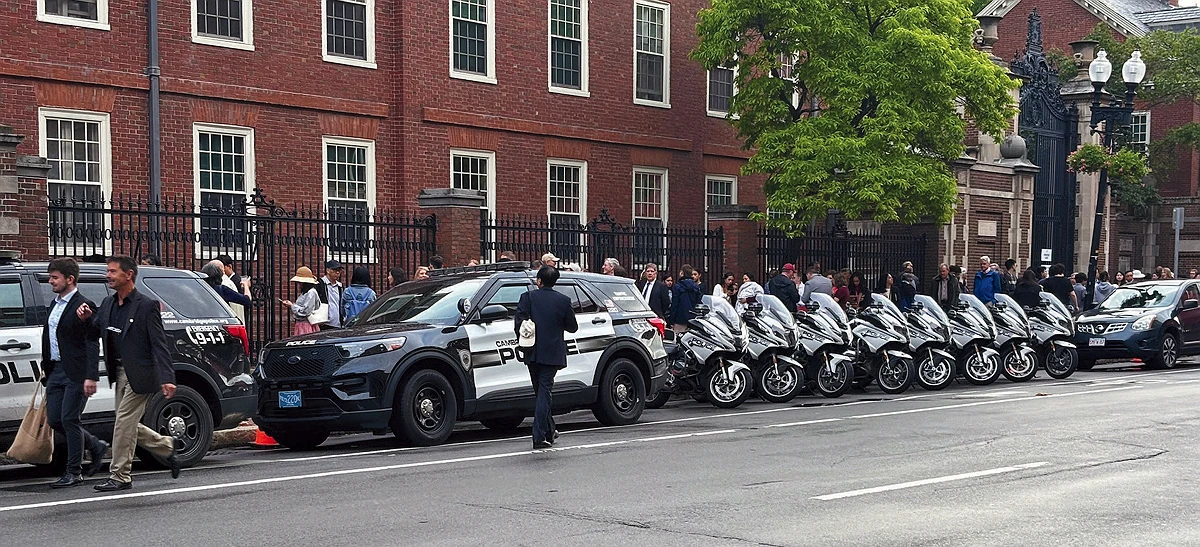
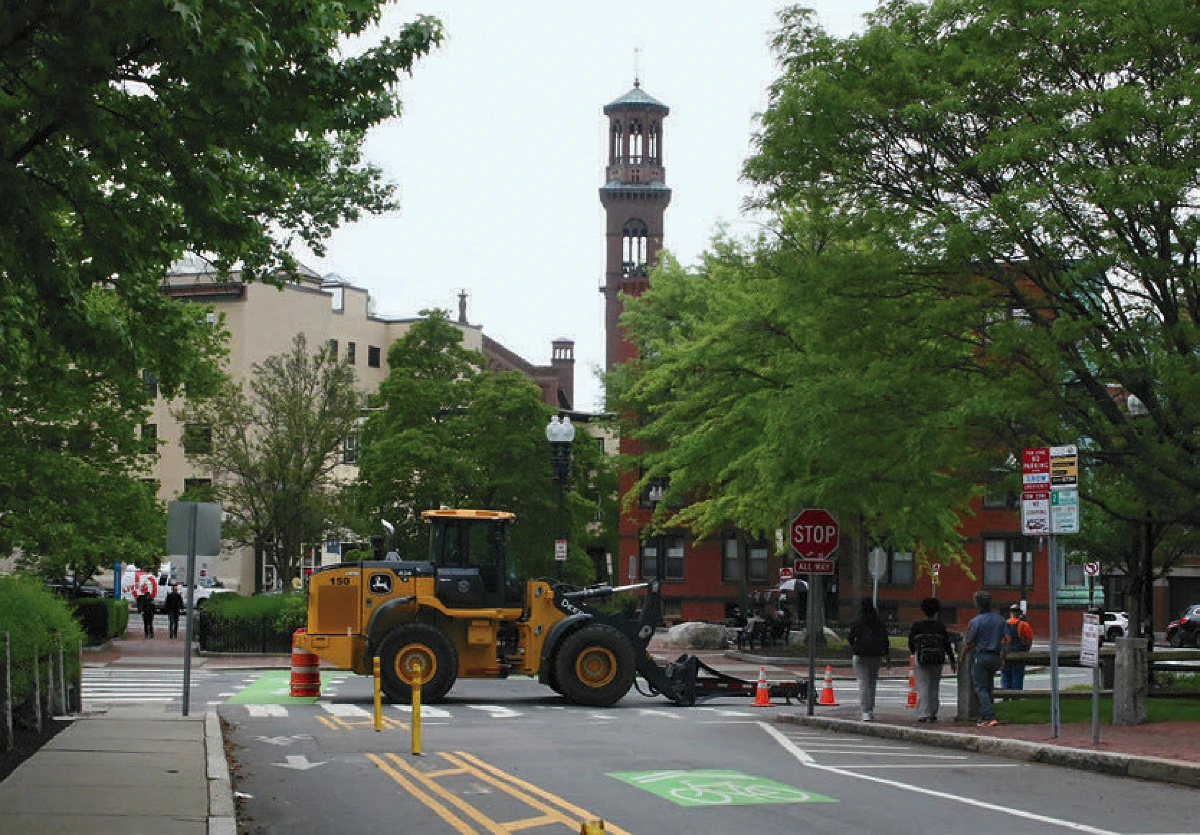
Addressing the graduates directly, Verghese urged them to make their decisions “worthy of the opportunities this great University opened up to you, as it works to preserve the value of what you accomplished here, and the values it stands for.”
Pusey Minister Matthew I. Potts, his voice resonant and reassuring, gave the closing benediction: “In its medieval roots…the word blessing carries a sense of woundedness. To be blessed means you have endured trials with courage, you have survived injury with integrity. Blessing honors you for who you are, but it also bends its knee before all you have been through.”
He concluded:
Beyond this Yard those of us on this stage see other things. We see a range of threats and dangers: to the world, to this University, to many of you, to many of us. But between all of that and all of this, we see you. And we’ve seen what you can do. Now go and do it.
The proceedings adjourned at 12:12 p.m. At the same moment, word came that a federal judge had extended a temporary restraining order that prevents the Trump administration from barring Harvard’s enrollment of international students. The news was no victory, however, as the Trump administration’s lawyers signaled that they would seek to accomplish the same end through another means.



